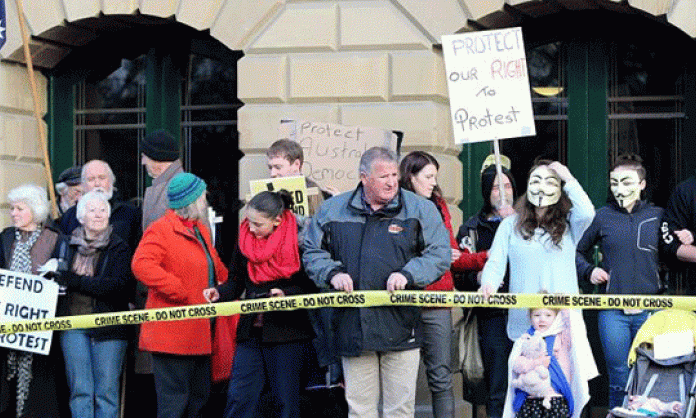The Tasmanian government is proposing new legislation that threatens basic civil liberties. The Workplaces (Protection from Protesters) Bill 2014, is all about protecting businesses from union and protest action.
It includes mandatory jail sentences, increased police powers and on-the-spot fines of up to $2,000. More ominously, there are mandatory $10,000 fines for “invading or hindering a business” and $250,000 for any organisation “inciting” such protest action.
The ramifications are serious. The offence of incitement is particularly menacing. The Tasmanian law defines “inciting” as promoting awareness of or support for an “opinion, or belief, in respect of a political, environmental, social, cultural or economic issue”.
If you’re marching past a business, if you protest in a public space that could give access to a business, if you speak out publicly in support of such protests, if you take any industrial action outside the limits of the Fair Work Act, you’re liable to be charged under the bill.
But Tasmanians are fighting back. The bill has provoked anger from unions such as the CFMEU, which covers forestry workers, from the Tasmanian Aboriginal Centre, civil liberties groups, the ALP and Greens, and also farmer organisations who’ve been fighting aggressive mining companies keen to frack their land.
There have been protest meetings, 500 at the last one in Hobart, and national protests in August, all part of a campaign to get the bill stopped in the upper house.
Bob Brown, more often on the side of moderation these days, declared, “Will Hodgman [Tasmanian premier] may jail me to take away my freedom in order to settle an argument he cannot otherwise defend. Paul Harriss [Tasmanian resources minister] may take my property … But like so many others here, and so many more beyond this City Hall, I will not be bullied or cowed by their brutal strategy.”
Brown has some experience of being jailed for political protest – as have many other Tasmanians. Alongside thousands of others, he was part of the iconic Tasmanian campaign against the damming of the Franklin River in the late 1970s. The campaign grew as successive governments refused to back down and dump the project, reaching a high point with a 10,000-strong march through Hobart in June 1980.
The tactic of writing “No Dams” on ballot papers in a 1981 referendum was popular, but it was the rallies and a blockade of the site from December 1982 – where more than 1,000 people were arrested and 500 jailed – that turned the tide.
Tasmanians also won a significant battle for LGBTI rights in the late 1990s. Tasmania was the last Australian state to decriminalise homosexuality. After protests, boycotts, a spirited battle for the right to have a law reform stall at Salamanca Market (with 130 arrests) and an appeal to the UN on May Day, 1 May 1997, the country’s most advanced homosexual rights law was enacted.
In “Hieroglyphic Staircase”, US poet Drew Dellinger asks, “Did you fill the streets with protests, when democracy was stolen?” Tasmanians can answer yes. They’ve been arrested, fined and jailed during battles of the past. Today, only with the revival of such a campaign can we win again.









